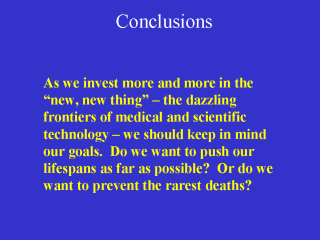 |
There are many ways to configure our health system and the outcomes we expect of
it, but we do have choices to make. For families faced with those rarest
diseases, it is understandable that one life saved is worth a comprehensive and
expensive screening program. From a public health perspective, I see a moral and
practical imperative for applying equitably within society that which we know,
as well as the new knowledge we will gain in the future. (I’m in favor of what
Jim Fries at Stanford has called the rectangularization of the life cycle-
meaning that when displayed as a graph, keep the quality of life as high as
possible to a time very near death, when a very precipitous decline in health
occurs followed rapidly by death. Or, restated – having a healthy well
functioning life until a ripe old age, and then a quick, painless exit...)
|
